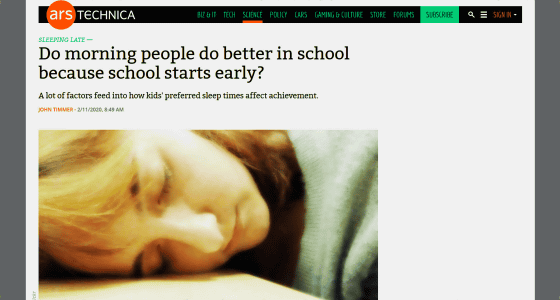How does student performance change when school starts at different times?

It has become widely known that people have their own sleep cycles, and in recent years there has been growing concern that `` teaching early in the morning may adversely affect the performance of night-time students ''. I am. A research team from
Interplay of chronotype and school timing predicts school performance | Nature Human Behavior
https://www.nature.com/articles/s41562-020-0820-2
Out of synch: Adolescents' internal timing and school start times | Behavioral and Social Sciences at Nature Research
https://socialsciences.nature.com/users/354278-maria-juliana-leone/posts/59485-out-of-synch-adolescents-internal-timing-and-school-start-times
Do morning people do better in school because school starts early? | Ars Technica
https://arstechnica.com/science/2020/02/do-morning-people-do-better-in-school-because-school-starts-early/

There is a gap of several hours between bedtime and wake-up time in morning and night-time people. 'Everyone who knows adolescents will feel they have a very slow sleep cycle,' Leone points out, adding to the development of the internet and other entertainment and biological For some reason, school students say they have difficulty starting classes early in the morning.
'Most adolescents have serious problems. They show a very slow sleep cycle, but they have to get up very early and attend classes. And early start-up hours, children have less sleep on weekdays than is recommended. ' In addition to short sleep hours, youths are suffering due to social time differences caused by different life cycles between weekdays and holidays.

On the other hand, Mr. Leone points out that even young people are good at getting up early, and in general it is understood that `` morning type students perform better than night type students '' That it is. Leone admits that morning students may have better cognitive abilities as to why students who get up early perform better. Students are performing better. '
Mr. Leone's research team decided that the school classes were “morning class (7: 45-12: 5)”, “day class (12: 40-17),” “night class (17: 20-21) Hours: 40 minutes) ', the students who went to school in Buenos Aires, who were divided into three time zones, were surveyed. In the schools surveyed, each student is randomly assigned to each time slot, regardless of their sleep rhythm.
The research team surveyed a total of 753 students, a group between the ages of 13 and 14 and a group between the ages of 17 and 18, attending three time slots. The questionnaire was used to determine whether the students were in the morning or at night, and how different their sleep habits were on weekdays and on holidays, and analyzed based on their grades at the end of the semester.

From the point that 'the students assigned to each time slot were random,' it was expected that the ratio of morning type and night type would not change in each time zone, but in fact, 'In the morning class, Most students are in the morning type. ' This result suggests that the students changed their sleep rhythm according to the class hours.
In addition, among students taking day and evening classes, the sleep rhythm of the 17-18 year old group was about 1 hour slower than that of the 13-14 year old group. On the other hand, among students taking morning classes, the sleep rhythm of the group between the ages of 13 and 14 and the group of ages 17 and 18 differed by only a few minutes.
Furthermore, when the fluctuations in sleep rhythm on weekdays and holidays were measured, in the morning class group, the average age of wake-up time was about 4 hours later for the group of 13-14 years old and the group of 17-18 years old on average It turns out. In addition, in the group of 17-18 years old, there was a slight difference in sleep rhythm between weekdays and holidays even in the group of day classes, and it is clear how large the '

Furthermore, comparing school performance, class hours, and sleep rhythm, it was found that, as in previous studies, in the morning class group, non-morning students had lower grades. The degree of disagreement between class hours and sleep rhythm affects grades, especially in mathematics, and it seems that grades have changed about twice as much as in other subjects.
On the other hand, the differences between sleep rhythms and performance also varied with the age and time of the student, and the results were very complex, the team noted. In the group of 13 to 14 years old with little difference between morning type and night type, there was no change in performance due to the difference in sleep rhythm in the day class group, but the difference between morning type and night type was remarkable In the 17-18-year-old group, morning class students performed better in the Japanese language in the day class. In the evening class, the research team noted that there was no change in grades between morning and evening classes.
While the results of this study confirm previous findings that 'students can perform better when sleep rhythms match the class hours,' There is no time zone to perform better than students. ' The researchers hypothesized that 'morning people are cognitively better than night people' and that 'morning people are better at coping with social jet lag.' He pointed out that a hypothesis is possible.
According to Ars Technica, an IT news site, `` The number of people who participated in this research was enough for social science experiments, but because students were divided into three class hours and two age groups, The number of people in each group is getting smaller. ' The small sample size suggested that the results of this study may be affected by statistical noise (fluctuations) and suspicious results. Still, `` this study shows that students can adjust their sleep rhythm to some extent during the required time, but it is also clear that some students have difficulty adjusting, '' Ars Technica said. You.

Related Posts:
in Note, Posted by log1h_ik







